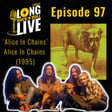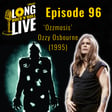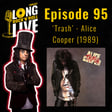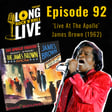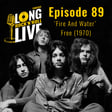Introduction and Morning Chat
00:00:21
Speaker
Hello there and welcome to another episode of the Long Live Rock and Roll Podcast. As usual on the screen opposite me is my good friend Mr Felipe Amorim. How are you doing man? Hey man, how are you doing? How's everyone? Good, good, good. Yeah, all good here. Thank you. Nice Saturday morning. Got the sun shining here. What about you? Where are you today?
00:00:39
Speaker
I'm in Wimbledon, my family's place today. What are you drinking? Well, it's not beer again. That's not really rock and roll, but I'm drinking coffee today. He's been in Spain for like 10 days, drinking beer every day. So this is the detox, right?
00:00:56
Speaker
Exactly. Excellent. Cheers. Cheers. Yeah, let's get the episode started.
Old Bands and New Music - Why Do They Keep Going?
00:01:02
Speaker
Felipe chose, he called me up last night and we were going to do an album, but then he had this idea. He said, you know what, we haven't done like a discussion episode in a while. So he said, how about this? Because he's been listening to some albums. And we thought, how about we do an episode about old bands
00:01:19
Speaker
who are still releasing and producing new music. Do you want to add anything to that Felipe or did I get it right? Yeah, well, that's it. That's exactly what it is. I mean, basically, the dinosaurs are still around, isn't it? At least in the rock and roll world, they're still there. They're still doing stuff. Yeah, they're not extinct yet.
First Concert Experiences with 'Dinosaurs'
00:01:38
Speaker
And I'll tell you this, my first
00:01:42
Speaker
live music experience, believe me or not, the first time I've been to a gig was Deep Purple, 1999 in Brazil. It's a great way to start my gig life. It's the first gig I've ever been to, one of my favorite bands. And at the time, the press in Brazil would say, you know, the English rock and roll dinosaurs are coming to Brazil, kind of like dinosaurs, come on. I would do a day at the time, 1999.
00:02:10
Speaker
So about 20 years after their first album, isn't it? Exactly. Well, a bit more, isn't it? Well, 70. Yeah, kind of almost almost maybe 25 years or something. I don't know. Still,
00:02:27
Speaker
In the rock and roll world, sometimes if the band is 10 years old, that's too much. You know, you're old. And everyone was calling them old. So these old guys coming here, playing music, and they were probably about 50 years old, which honestly, in this day and age, you can be very healthy at that age, and you can be very predictive. And it's very exciting.
00:02:55
Speaker
The show's fucking brilliant. I mean, those guys, they keep improving. I saw them live a few other times and the older they got, the better they were sounding, in my opinion. Interesting, isn't
Evolution of Live Performances Over Time
00:03:07
Speaker
it? Because I think that is something that could definitely happen with live music. I think that when you have bands who just keep
00:03:14
Speaker
I mean, songwriting is something we'll obviously talk about a lot in this episode, but in terms of live performance, maybe it's worth sort of talking about that for a bit, is that you can practising that much ever be bad for you. You know, when you're on tour, you do two things. You practise the songs and you play the songs, as you and me very well know. And it's like, you know,
00:03:35
Speaker
what you do is certainly if you're playing the same songs every night with with the same artist or the same band then what ends up doing is you end up practicing part so if you're doing a song and you're doing a guitar solo i think a guitar solo is like the easiest the most obvious one to sort of pick out but
00:03:50
Speaker
if you're doing a guitar solo you've got a set solo maybe for one song and when you're practicing it in the sound check you maybe try some different bits you try a new technique you try some tapping or you do this and that and then come show time you think do you know what i'm not confident enough to do it tonight let's give it a couple of goes this normal solo and maybe on night three we'll do it
00:04:10
Speaker
Night 3 comes along and you stick in the tapping or the special kind of guitar skill, and then that's like a way of practicing, isn't it? It is practice, yeah. For year after year, show after show, tour after tour, it's no wonder the band's like, you said like Deep Purple, just keep writing, keep playing, keep performing, get better. Yeah, I'm just gonna quote Ian Pace on that because someone asked him if it was
00:04:35
Speaker
if he ever got tired of playing Smoke on the Water and he said, well, I never played that song in the same way. He's always improvising, he's always creating on top of it. And I think you get so used to the structure of the songs and the melodies and the lyrics and everything, you know where you are. It's just like,
00:04:59
Speaker
it's like as natural as driving a car or it's just something you do, you go and do it. So I think definitely the live performance element gets better unless people are not. Some musicians have been criticized by not sounding that good live because maybe
00:05:19
Speaker
Or maybe they didn't stay in shape in terms of their practice when they're not touring. And then maybe when they get old, it's not even the age that makes a difference. It's the fact that they became a bit lazy or be too comfortable, you know, and then they just don't don't practice anymore, whatever. But usually as a band,
00:05:40
Speaker
It tends to improve, doesn't it? If you tour with the same lineup and you play every night and you go on tour and you just sound really tight. So I think in terms of live performance,
00:05:55
Speaker
I'm very satisfied with all the old guys who are still around. I don't think there's any band that I see playing anything. All these guys, they should have retired long ago. I'm really happy just because I'm a classic Rock fan, so all the guys I listen to,
00:06:12
Speaker
But they were around in the 70s. So I'm glad they're still out there performing to start with. I think that's the main thing for me. I'm really glad that those people still bother leaving their homes and getting on the road to deliver some music for us.
00:06:28
Speaker
that's the thing like you said it's about delivering music for the fans and you know when I saw Iron Maiden back in 2008 with their what was it called it was the somewhere back in time tour and they were playing all the music so they went on this famous tour that is famous for being on the live after death live album
00:06:49
Speaker
and that was the tour they did after the power slave album came out and it was a set of 17 songs and then 2008 they played it again the same 17 songs and I don't think there was any new ones added so that was like a throwback for the fans to the classic Iron Maiden that they were playing because
00:07:05
Speaker
you know just like any live band you release an album you play a set list full of songs from the new album and then a couple of classics before and after the new songs for example but Iron Maiden did this to give the fans something they wanted and they've done this a few they've done this recently as well called legacy of the beast tour the same thing they're playing they looked at a tour they did in the late 80s and they took the same set list and they're playing it again now
Why Do Old Bands Still Perform? Love, Money, or Both?
00:07:30
Speaker
And I think keeping fans happy is a big part of what these dinosaurs are doing now, isn't it? Yes, and I want to ask you this question. What do you think is their main motivation? I mean, not Iron Maiden, but any of those bands who are still out there, is it
00:07:52
Speaker
The love of making art or producing music or performing music, is it the money or is it a mix of both? That's a hard one because I think that you're going to get different rewards from different things. I mean, when you're in the studio songwriting, we both know that there can be certain moments when you're getting to record an album where things just click.
00:08:20
Speaker
and a certain thing happens you record a certain drum part and then we all go oh yeah fuck yeah that was great and then that intensity and the level of um
00:08:30
Speaker
the level of spontaneous quality that we've just found can then be emulated because the rest of the band get excited and they're like, yeah, fuck yeah, let's make this song even better than we thought it was going to be. So I think there's the reward for that. There's the creative reward in the sense of you thinking that actually we're still making music that is getting us excited about our own music. And at the same time,
00:08:56
Speaker
who's going to turn down money for the sake of it you know exactly i think when yeah well when cream got together again where they did the reunion gig or gigs i don't know if it was just one they actually released as a dvd um i think well clapton was in a really
00:09:18
Speaker
good financial position in life, let's put it like that, but I think Ginger Baker and Jack Bruce kind of needed the money, but I think Clapton said that even for him it was a lot of money. So it was worth doing it to have the extra cash because what we don't realize is like obviously not all of the bands we like
00:09:40
Speaker
you know, not all of them are millionaires. Some of them were millionaires, they're not anymore. Some of them maybe have never been millionaires or are not that well off. Well, to the point that we, you think they don't need to work, you know, like, so also even the guys who have loads of money, I believe, you just suspend according to how much you earn, isn't it?
The Financial Necessity of Touring
00:10:05
Speaker
Yeah. I mean, it's like sometimes you see a middle class person who's got as
00:10:10
Speaker
much money to spare as a poor person, because you keep that middle class lifestyle, so you just keep spending. So some of those guys, you know, for many reasons, they spend a lot of money and you can earn millions and still being debt. So I believe some of them are touring because, you know, it's a job, I've got to do my job. But I think as a musician, we can clearly say that this, I think we can
00:10:35
Speaker
We have the experience, let's just say, the music more than a job is an addiction, isn't it? Yeah, especially to be part of a creative process that delivers results for so many people. For the last few years, myself and Felipe, we were playing for an artist called Jack J. Hutchinson.
00:10:57
Speaker
when we go to the gigs, so for those who don't know who haven't followed mine and Felipe's career in quotation marks, we were playing for him for a certain amount of time and then on this last album we were both producers of this album and I had a songwriting credit on one of them, me and Felipe had a songwriting credit on another tune and
00:11:17
Speaker
When you go to the gigs, when we end up going to playing these songs to the gigs and the audiences, there is a certain sense of pride when a certain fan comes up to us at the end and says, guys, that was even better than the last show, which he came to yesterday.
00:11:32
Speaker
you know who I'm talking about don't you? Shout out to Mr Pete Hearn, absolute legend, yeah fantastic guy. But seriously he would come and he would say and not just him others as well would all come and say guys that was incredible, I see your producer you know you're doing production on the new album, thank you this these songs sound wicked you know and we said well listen we didn't write all of them we hardly even wrote most of them but
00:11:56
Speaker
to feel that we have had an impact on a piece of art that has touched and brought joy to so many people is addicting, isn't it?
Continuous Improvement in Live Performances
00:12:06
Speaker
Yeah, it is. And I think it's kind of, if someone says that, you know, the gig sounded good, and then it's like, okay,
00:12:13
Speaker
Can I top that? Yes, exactly. So, and then you feel challenged, like, oh, you know, can I do it again tomorrow, but slightly better? Is it? Yeah, so I was just saying, go on, please go. No, no, it's like, maybe the wrong stones are thinking, can we play science fiction better than last time? Can we play better than 50 years ago? Imagine they said that every night. I mean, how much better have they gotten?
00:12:43
Speaker
I think they did. Again, I saw them in 2006, Copacabana Beach in Brazil, about two million people in the audience, I think is a world record. And they were really good as a live act. And I saw them again Hyde Park recently. Well, in my humble opinion, they were better.
00:13:13
Speaker
So here's the thing, we're talking about the live performance element of it and I think we could kind of agree that if the bands work hard enough on it, they can sound better.
00:13:29
Speaker
as they get older. I think that it's possible. Right. I think if you give the time, the dedication and the effort towards it, I mean, it's definitely possible. I mean, I watched the movie yesterday night. We had a friend over. So me and my wife with our friend watched The Dirt, which is the Netflix. Have you seen it? Oh, it's the
00:13:53
Speaker
That's the one, yeah. It's called The Dirt and it's on Netflix. It is a crazy film. I mean, you do wonder, you know, how much have they slightly over exaggerated certain elements just to make it look more rock and roll. But I have no doubt that, you know, in general, that is the way the lifestyle was for them. And you think when you when you start abusing your body to the level that they were in terms of the heroin and the alcohol,
00:14:19
Speaker
that's when I think the liveness of a band can suffer, because you're not doing yourself any favours, you're not looking after your body. But when a band can commit and dedicate and put the time and effort, and even not just putting the time and effort in, but wanting to put the time and effort in, wanting the band to sound tighter, just going back to you and me playing with Jack, we'd do nights where we would
00:14:45
Speaker
you know we'd come off stage having played a fantastic show and then but me and Felipe would go and we'd talk and we'd say listen do you know that section in this song you know when you go into the next part maybe push it maybe you hit a cymbal and we push into the beat and that's going to give it a nice driving sound
00:15:00
Speaker
So even though we've played these fantastic shows, you know, in our opinion, we still think, how can we make this better? And that was, we've done that over the course of what, four years? And I think the songs have gone from, I don't know, let's call it a level eight to a level nine because of that. Imagine any choice stuff.
00:15:19
Speaker
No, you try stuff. If it doesn't work, don't do it again. If it works, do it again. Simple. But now imagine that trial and error with a band is now lasting 50 years. They might get to such a level. I mean, you know, like I said about Iron Maiden, they headline download this year, 2022. They started in 1975. So 75, 85, 95, 55, 15, 20, almost 45 years, almost 50 years.
00:15:44
Speaker
With lineup changes, with some lineup changes. Yes, but not crazy lineup changes. No, not at all. I think the final form was set in 1990. Bruce Dickinson left for a bit and Blaise Bailey came in and then they switched back in the early 2000s, but overall they have had this solid lineup for a good few decades I reckon.
00:16:08
Speaker
Yeah, so that seems like in some cases, the lineup change can be kind of refreshing for the band. I've mentioned Deep Purple before, and we'll talk about them again, which when Steve Morse joined the band, or he suddenly had to leave now because, you know, personal issues, family issues. But when he joined the band, he brought this new blurt. First, he's younger than the other guys.
00:16:35
Speaker
and is from a different country, different culture, different background. He plays guitar in a very different style than Richard Blackmore used to play, so he turned them into a different band.
00:16:50
Speaker
and brought a whole new group of fans to their fan base. People who have already, fans of Steve Moore, started listening to Deep Purple and stuff like that. Sometimes you have that
00:17:08
Speaker
lineup change that brings something to the band, like Pink Floyd, when Roger Waters left and Guillermo decided to carry on being the lead singer, it's a different band. Some people don't like it. I personally think that's really, really cool stuff that Pink Floyd had produced.
00:17:27
Speaker
after Roto Waters. It just takes too long for them to do stuff, isn't it? They don't seem very motivated. Maybe, you know, because maybe they don't have the financial motivation to do stuff. But in terms of live performances, I think, even when you change someone in the band, then you feel like challenged to sound better than the previous incarnation of the band. And I think it's
Challenges of Creating New Music for Old Bands
00:17:52
Speaker
For me, it's clear that it's worth going on tour, regardless of your age, regardless of how long the band's been around, as long as the band can still deliver. If it's as good as it was, or slightly better, or slightly worse, I mean, it's acceptable, isn't it? If you want to go and see your heroes on stage. I think that things change a lot when you're talking about recording a new album.
00:18:19
Speaker
And then when you're talking about an old band trying to come up with new material, do you know what I think? Sometimes those guys go in the studio and think, yeah, let's just record something. And they don't have maybe the same energy or motivation. Because imagine you're 20-something, you've got loads of heighties. Everything in life is new, relationships and arguments.
00:18:47
Speaker
and whatever, all sorts of personal experiences, you have that sort of stuff to put into your music. And assuming you kind of slow down a little bit with age, maybe you're gonna have less life experiences or different life experiences to put into your music. So it might be harder to write songs, you know? Excuse me. So I imagine it's,
00:19:17
Speaker
It can be harder to create something. But I imagine if you get into studio and if there's a record label, there's money into it, and you are about to release a new album, and everyone is waiting for it, and you do the first song, you think, this is not good. You just have to carry on anyways. You've got to finish it. So how many albums have been finished under those conditions? That's a good point. Yeah. I mean, have you heard of the MMA fighter called Conor McGregor?
00:19:46
Speaker
Yes. Everyone's heard of Conor McGregor. There's this thing going around recently where
00:19:52
Speaker
So at one point, he was probably considered one of the best mixed martial artists on the planet. And then because of that, because of some of his results from fights, he accrued a lot of money. And his last few mixed martial arts fights, he's lost and quite convincingly. But the idea is that the talent is still there. But I can't remember the phrase. How do you go and train when you wake up in silk sheets?
00:20:19
Speaker
because how do you build your motivation to the point where, well, actually, do you know what? He doesn't need to win this world title because he was already the champion before. He doesn't need a huge payday because he's a millionaire already. How do you wake up at 7 a.m. to go for that run and to get to the gym an hour later when you're in your huge house with your silk sheets? Everything you want is around you. And that might be the same, I think, as what you're saying with the band.
00:20:48
Speaker
Yeah, go on. That was the same thing with James Hunt in Formula One, isn't it? He managed to win one championship in 1976. And then he was like, yeah, I'm just going to have fun. Exactly. I've done it. I never won again, but still doing it because he was still doing it to a certain age because he was like, oh, this is the job, isn't he? You've got to do your job. But yeah, but I think some people kind of still
00:21:17
Speaker
manage to challenge themselves and keep trying to improve. But I think it's different with athletes. They're going to start struggling a lot with age, whilst musicians not necessarily
00:21:41
Speaker
that is the main thing. Physically, there's always so much you can deliver as an athlete. Let me ask you, what about mentally? What about the amount of ideas? Choose any of those bounds we're talking about. How do you keep churning out new ideas and fresh ideas? Or if they're not new and fresh, how do you keep repeating formulas that you've been doing for the last 30, 40, 50 years?
00:22:07
Speaker
That's a good point. I'm just going to follow up your point and ask you after we spoke about McGregor and Hunt.
00:22:18
Speaker
So you said about Hunt, he won his Formula 1, he won his championship and now he kept doing it because he loved what he did. Do you think there is an element with some of these bands that they are trying to sort of relive the glory days, they're trying to recreate what it was like writing an album in the 70s or whatever?
00:22:40
Speaker
I think it's funny because somehow, as I said, you can kind of recreate that atmosphere on stage, but in studio it's not the same thing, isn't it?
Impact of Technology on Recreating Old Sounds
00:22:50
Speaker
Technology changes and then sometimes you have a different producer. Remember like, especially, you know, the classic rock guys, they used to get into a studio and play live. Just play and record live. Whilst, you know, nowadays most record labels would
00:23:11
Speaker
getting them a producer who's not going to allow them to work like that. They're going to do one instrument at a time. So technology changes, the environment in the studio is not the same as it was like 30, 20 years ago, maybe. So it's just, I think if they try to recreate, it's really,
00:23:35
Speaker
I don't know. I think that's a recipe for disaster most of the times if you really try to just recreate what the band was 30 years ago, whatever. What do you think? Like, what do you think about the new Iron Maiden album? Because you know the album really well. And is it just like trying to sound like old Iron Maiden? What do you think is actually new? There's new elements to it.
00:23:57
Speaker
The problem is is that Iron Maiden have never stopped sounding like Iron Maiden, old and new. So in this situation where it's really tough because Iron Maiden from the mid from 2000s onward
00:24:14
Speaker
they've had loads of hits and misses with albums. But the thing is, is that they have all sounded like Iron Maiden. So you can't ever say to them, oh, this album sounded too proggy, or this one was too light and too poppy. It's all Iron Maiden. But it's just, it's almost like, I can't describe it. It's like that some of those albums have that final extra 10% that made it what it is. And the others just lack it a little bit. It falls a little bit short.
00:24:43
Speaker
So of the Iron Maiden albums, 2001 Brave New World. So Iron Maiden started in 1975. So that's 75, 80, 90, zero. So that's 30 years, or 20, 25 years. 2001 they had Brave New World, which was a stunning album. I really liked that one. Yeah.
Iron Maiden's Musical Journey: Hits and Misses
00:25:03
Speaker
2006 was one called, is it Dance of Death? Or I don't know about the year, but Dance of Death. That was okay.
00:25:13
Speaker
A Matter of Life and Death came after that and that was okay. Then after that came The Final Frontier, which was just a stunning album. Critics loved it, I loved it, Maiden fans loved it, and it was just full of such a fantastic array of songs. Some really long, others short and sweet. And it was just fantastic Iron Maiden, and we thought, fuck yeah, this is what Iron Maiden is from now on, give us more of it. Then six years later, The Book of Souls came, and it was kind of like, it was like, wow.
00:25:42
Speaker
There's some good songs, but it doesn't it doesn't hit the same way the Final Frontier did. And Senjutsu, the new one, 2021. Same thing, really. It was like, yeah, there's some there's some there's some good moments here. There's some good songs. But ultimately, nothing new. But then again, as I just said, what when have made an ever done anything new? It's always been. Yeah, that's that's interesting, really, because they for them wasn't
00:26:11
Speaker
difficult task to stick to the formula because that's that's that's what they are and they didn't try to look let's do something completely different let's shock the world doing like a you know prog rock album or or jazz influenced metal whatever there was like none of that this is Iron Maiden gonna sound like that
00:26:30
Speaker
Just so you can tell, guys, this is actually, I mean, you're going to see it in the title, but this is going to be part one of this discussion. We're going to have another episode coming in two weeks, which will finish off this discussion. I just want to finish off this episode with this segment. We're going to finish off with Lazz Unleashed. This is my Lazz Unleashed to Iron Maiden.
00:26:57
Speaker
If you're listening, Iron Maiden songs for me, they're very long now. The Final Frontier had a nice variety, a couple of four minute songs, a five minute song here, but then you had quite a few six, seven, eight, nine minute songs. The Book of Souls was a very long album. Most of the songs I think sat at seven plus minutes and the new one as well, Sun Jitsu.
00:27:23
Speaker
that I think they're too long now. I think we've, and this is my guess as a fan, I still need to make it clear, and it's my little disclaimer, I love Iron Maiden, one of my favourite bands, but I think there was a point where they might have run out of riffs and ideas and what to do, because in the last album, Sinjutsu, one of the songs had a few little guitar melodies that I'd heard from previous albums, but with one note changed, you know, or rhythms slightly changed. And so,
00:27:50
Speaker
We know Iron Maiden. We know that you can write these songs that are long, take you on this journey, full of riffs, full of solos and all this stuff. What I'd like is I'd love Iron Maiden to do something new. And I say new, but what I mean is this. Everyone go and check out, as usual, I don't know actually how many songs we're going to have in because we're not really talking about a band or an album, but
00:28:12
Speaker
As usual, the playlist will be in the bottom of the show notes. I'm going to put in Can I Play With Madness, which is an Iron Maiden hit from the 7th Son of a 7th Son album, 1988, I think that was. Can I Play With Madness is a short three-minute song that just completely embodies everything Iron Maiden is about. It is fantastic. It's got a great solo. Bruce Dickinson's fantastic vocals are really awesome sing-along chorus.
00:28:41
Speaker
three and a half minutes long. I'd love Iron Maiden to do an album full of three minute songs, just to try. It's like, come on, the last five albums you've done, they've all been really long. They've all been epic, you know, epics in terms of length. They're good, but I'd love, I'd love it. For me as a Maiden fan, it's all getting a bit similar now. And when I talk to other Iron Maiden fans, they're either not interested, they don't care for the new album, or it's like, well, yeah, it's fine, but. I think it should email Bruce, just saying. If I send him the segment. Yes.
00:29:11
Speaker
Yeah, send him the podcast link. Listen to this whole episode. At the end, there's a mention. If I email this to you, Bruce, if you're listening, I'm a huge fan. Thank you for everything you've done. You've emboldened, you've enriched my life with music. But
00:29:29
Speaker
I'd just love to hear something different, but yeah. And it's going to be an album for you specifically, so they should record something dedicated to you and with you on the album cover with, what's his name, Eddie? Eddie. Is that too much to ask? Yeah, imagine you and Eddie on a kind of MMA fight.
00:29:51
Speaker
playing a run the rink. Yeah, that'll be great. Anyway, guys, right. This is going to bring the end to this episode, which is, again, the first part of the two episodes on this when dinosaurs ruled the world special, which Felipe came up with that name, which is incredible. In the next episode, which is going to be released two weeks from now, we're actually going to go into a bit of a discussion about some albums in specific and talk about some bands, what they've released, how it compares
00:30:18
Speaker
Was it a hit? Was it a miss? Do they sound like themselves? Do they sound like the old themselves? So please join us in two weeks for the next part of this discussion. As usual, you can find us on socials and Google and the internet. So please feel free to join us. And keep on rocking everyone. And as usual, long live rock and roll.











